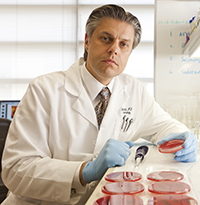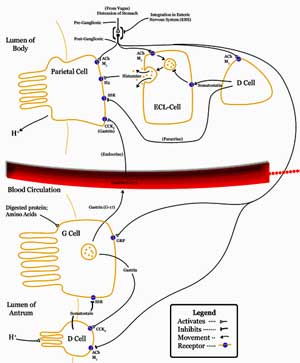

Small Intestinal Bacterial Overgrowth (SIBO)

In SIBO large numbers of bacteria in the small intestine cause gas, bloating, interrupt nutrient uptake, etc.
Small Intestine Bacterial Overgrowth or SIBO is a chronic condition or infection of bacterial overgrowth in the small intestine. Normally the small intestine has low numbers of bacteria and the large intestine has high numbers of bacteria; however, in SIBO bacteria exist in large numbers in the small intestine which interferes with proper digestion and can lead to nutritional deficiencies.
Bacteria in the small intestine thrive on carbohydrates and produce a lot of gas and endotoxins that can exceed the liver’s detoxifying capacity, creating a state of toxemia. SIBO is associated with damage to the lining or membrane of the small intestine, and is also referred to as Leaky Gut Syndrome.
The symptoms of SIBO include bloating, gas, constipation and/or diarrhea, abdominal pain, nausea, and heartburn. Systemic symptoms include fatigue, sleep disturbances, headaches, brain fog, joint and muscle pain, and food allergies and sensitivities. SIBO is associated with many chronic health conditions, particularly Irritable Bowel Syndrome, and occurs frequently if not always in ME/CFS and FM. Although not the primarily cause of these syndromes, it is a complication that is important to address.
Testing
SIBO is diagnosed with a breath test that measures the hydrogen and methane gas produced by bacteria in the small intestine. Patients drink a sugar solution of glucose or lactulose after a 1 or 2 day preparatory diet. Measurements are taken at a baseline (before consuming the solution) and then every 15-20 minutes for 1-3 hours.
The lactulose breath test diagnoses overgrowth in the distal (lower) end of the small intestine where SIBO is more common. The glucose test can only measure gas in the upper end.
The three hour lactulose breath is considered the gold standard for doctors who specialize in SIBO. Typically patients who produce high levels of hydrogen suffer from diarrhea, and patients who produce high levels of methane suffer from constipation.
Dr. Mark Pimentel’s Protocol
Dr. Mark Pimentel is the pioneering researcher and gastroenterologist who discovered the link between bacterial overgrowth in the small intestine and Irritable Bowel Syndrome. He is director of the Gastrointestinal Motility Program at Cedars-Sinai Medical Center in Los Angeles and author of the book A New IBS Solution Bacteria – The Missing Link in Treating Irritable Bowel Syndrome.[1]
His treatment protocol is three-fold:
Antibiotics
First he prescribes a short course of antibiotics to eradicate bacterial overgrowth. If a patient has high levels of hydrogen they take rifaximin (Xifaxan), and if they have high levels of methane they take rifaximin and neomycin. These antibiotics are particularly effective because they are not broad based, and they remain inside the gastrointestinal tract.

Dr. Pimental is the Director of the Gastrointestinal Motility Program at Cedars-Sinai (http://giving.cedars-sinai.edu/page.aspx?pid=2423)
After finishing the antibiotics a breath test is repeated. If gas levels are still abnormally high he prescribes another round of antibiotics. If bacterial overgrowth remains resistant after several rounds of antibiotics, he recommends that patients follow a two week elemental diet where they drink only water and replace meals with a formula (brand name Vivonex Plus) containing protein from free amino acids, carbohydrates in the form of maltodextrin, fat as various oils, vitamins, and minerals.
Diet
Second, Pimentel places his patients on a diet of foods that are easily digested, so that most of the food can be absorbed higher up in the intestine–away from the problem bacteria. This means eliminating high fiber foods such as beans, peas, whole grains, nuts, and soy. The diet also avoids all kinds of sugars that feed the bacteria, including lactose found in dairy products.
Prokinetic agents
Third, he places his patients on a prokinetic drug for at least three months to increase small intestine motility with a corresponding decrease in the duration of migrating motor complex cycles.
The most effective prokinetic drug is tegaserod (Zelnorm), but it was withdrawn from the US market in 2007 due to FDA concerns about possible adverse cardiovascular effects.
Alternative prokinetic drugs are low dose naltrexone (LDN) and low dose erythromycin. The body produces the most cleansing wave activity when a person is not eating, which is why the drugs are prescribed to be taken at bedtime. For this same reason Pimentel advises to limit food intake to three meals a day, and to avoid snacking and consume nothing except water between meals.
Cause
Possible Autoimmune Connection
According to Pimentel, bacterial overgrowth in the small intestine causes an autoimmune response that damages the nerves that control the migrating motor complex. Eradicating the bacteria alone is not enough to completely heal from SIBO. Patients who take antibiotics and do not follow up with diet recommendations and a prokinetic drug often relapse.
Increased Risk Factors for Fibromyalgia and Chronic Fatigue Syndrome Patients

Dr. Pimental believes low levels of stomach acid in ME/CFS patients increases their risk of bacterial overgrowth in the small intestine.
Pimentel thinks that food poisoning may initially cause cleaning wave inhibition, setting the scene for SIBO in many patients with IBS. Patients with ME/CFS or FM are particularly susceptible to SIBO because they typically have low levels of stomach acid that reduce bacteria at the onset of digestion, and they have low levels of endorphins that regulate contractions in the intestinal walls.
Pimentel did two studies linking SIBO and FM. In the second study, published in 2004, he found that FM patients had hydrogen levels significantly higher than non-fibromyalgia IBS patients and healthy control patients. [2] These high levels of gas produce exceedingly large amounts of bacterial toxins or endotoxins, which could explain some of the symptomology of FM. Furthermore, he reports a case history of a woman who was diagnosed with FM whose symptoms resolved after completing Pimentel’s treatment.
- See Esther’s story of significant improvement in ME/CFS after antibiotic treatment for SIBO
SIBO Center for Digestive Health
A group of naturopathic physicians associated with the National College of Naturopathic Medicine in Portland, Oregon founded a SIBO specialty called the SIBO Center for Digestive Health.
Their treatments are based on the research of Dr. Pimentel, but they also include herbal antibiotics and various diets.
Dr. Allison Siebecker, a founder of the center, has an educational website with information about SIBO including overviews of treatments, diets, studies and resources. Included on the website are lectures that can be downloaded for a fee from leading clinicians and researchers at the SIBO Symposium that took place in Portland in January of 2014. The physicians at the SIBO Center have found that herbal antibiotics are often as effective as pharmaceutical antibiotics, although the course of treatment is typically longer.
The herbal treatment of choice is Allimed, a high potency, concentrated form of allicin extracted from garlic.
The SIBO Center recommended diets include the Specific Carbohydrate Diet (SCD) described in Elaine Gottschall’s book Breaking the Vicious Cycle; the Gut and Psychology Syndrome Diet (GAPS), an expanded SCD diet and protocol created by Dr. Natasha Campbell-McBridge; the Low Fermentable Oligo-Di-Monosaccharides and Polyols Diet (FODMAPS), a diet low in fermentable carbohydrates that has been shown to be effective in persons with IBS; the Cedars-Sinai Diet (Dr. Pimentel’s diet); and some combination of these diets.
My Story
It took me many years to learn about SIBO and its connection with my health. I began suffering from chronic fatigue in 1973 and initially had no problems with my digestion. Over the first ten years of my condition, however, I became increasingly sensitive to sugar and alcohol, which increased muscle tone and worsened my chronic headaches. Eventually these foods made me hot at night and interrupted my sleep.
Eliminating them from my diet was one of the most effective ways for me to manage my symptoms, but over time the list of things that I reacted to increased to include food with even a small amount of sugar such as that found in salad dressings, sauces and baked goods, and all kinds of fruit. In retrospect, I think that the diet I arrived at was helpful because it discouraged the overgrowth of bacteria in my small intestine. I knew that I had low stomach acid, and at one point took hydrochloric acid capsules with meals, but that acid supplement did not seem helpful.
In the fall of 2001 my health took a turn for the worse when I developed fibromyalgia muscle pain following physical activity of any kind. This was accompanied by even more disturbed sleep and gastrointestinal problems. Whole grains, beans, and nuts, which I had tolerated well in the past, made me constipated and caused bloating. I passed odorless gas throughout the day and night. My bowel movements consisted of small green or orange/brown balls, which I passed most days. I suspected, however, that I had slow transit because after doing enemas I would not have a bowel movement for a week.
Beginning in 2005 I began a series of breakthroughs in my health. My thyroid function stabilized after taking compounded T3 in incremental doses according to Wilson’s Low Body Syndrome protocol; my cardiovascular function and breathing improved with Oral Systemic Balance, a therapy that improves ease of breathing and restores balance to the autonomic nervous system through specially designed oral appliances; and I reversed years of adrenal exhaustion with LENS neurofeedback. Although I no longer suffered from chronic fatigue my digestion, muscle recovery, and sleep improved only slightly with these therapies. I felt like I had solved the big challenges of my health condition, but I was left with some kind of complication or collateral damage.
I consulted a plethora of medical and alternative doctors about my remaining symptoms. It was clear that I suffered from some aspects of fibromyalgia – muscle pain, sleep disturbances, and gastrointestinal complaints, but my pain was never random and manifested itself as delayed onset muscle soreness that did not improve with conditioning.
Although my bowel movements were abnormal, I did not experience any gastrointestinal pain if I adhered to my diet. And I never experienced any kind of brain fog or cognitive difficulties. I also had a positive ANA and low levels of amino acids.
My doctors suspected that I had some kind of infection; however, extensive testing did not turn up anything – no intestinal parasites, candida, Lyme and co-infections, or mycoplasma. Over a period of ten years I had multiple GI tests used by naturopathic and holistic medical doctors including the Comprehensive Digestive Stool Analysis by Genova Diagnostics and the Expanded GI Panel by Diagnos-Techs.
The tests showed heavy abundance of some nonpathogenic bacteria and the presence of Helicobacter pylori but were otherwise normal. I consulted for a year with Dan West, an independent scientist in the field of Human Probiotics, but did not experience any improvements in my health from taking his supplements.
Results from the American Gut Project, a crowd funded study that sequences the microbes of thousands of individuals, showed a wide divergence in my microbes from the average person of my age, gender, diet, and body mass index, and found large numbers of a less common phylum of bacteria called Verrucomicrobia that are abundant in the soil and water environments.
In the winter of 2014, my naturopathic physician suggested that I try taking a teaspoon of apple cider vinegar in water before each meal to help my digestion. Introducing apple cider vinegar improved my muscle recovery by 15%, so I suspected I was on to something significant.
Another naturopathic physician suggested that I might have SIBO, a condition that I had never heard of. She recommended a one hour glucose breath test from Metabolic Solutions Incorporated. The test results were negative but I suspected they were inaccurate.
I found Dr. Siebecker’s website and read Dr. Pimentel’s book A New IBS Solution which recommended three hour lactulose breath tests. My doctor ordered three hour tests from two separate labs (Commonwealth Laboratories and NCNM Clinic Lab) simultaneously. The results were similar – high levels of both methane and hydrogen.
In April of 2014 I traveled to Portland, Oregon to see Dr. Melanie Keller, a naturopathic physician at the SIBO Center of Digestive Health. Subsequent appointments were made via Skype, which works well for out of town patients.
Dr. Keller recommended that I take 2 capsules of Allimed three times a day for four weeks. This dose made me constipated and gave me a heavy cramp-like feeling in my abdomen. Then I started taking the magnesium product Homozon that moved my stools and eliminated these symptoms.
Over the course of the treatment I stopped experiencing gas and bloating and my muscle recovery gradually improved to the point where I have now returned to an active lifestyle of gardening, walking, and practicing the piano with no adverse effects. Dr. Keller suggested I take ginger root, a natural prokinetic agent (capsules of 1,100 mg. 2x a day).
This resulted in an improvement in my sleep, an unexpected but welcome outcome that has convinced me that my sleep disturbances are due to problems with the migrating motor complex. My followup SIBO breath test showed a significant reduction of hydrogen and methane gases but still well above normal levels.
Dr. Keller next prescribed a ten day course of rifaximin and neomycin and a pharmaceutical prokinetic drug. In general my health is improving at a steady and sure pace. I know that treating SIBO successfully is a process, but I remain confident that I am on the right path.

Darden’s sleep and gut issues and ability to exercise have all improved as her SIBO has been treated
SIBO is the last piece of the puzzle for me in a long and complex story of chronic illness. I suspect that it plays a significant role in the symptomology of both chronic fatigue and fibromyalgia syndromes. Alternative health practitioners stress the importance of detoxification programs for healing, but my personal experience with these programs, which I pursued extensively, was that they barely made a difference. This makes sense because the bacteria in the small intestine is constantly spewing out endotoxins, which the liver cannot keep abreast of.
The role of the thousands of microorganisms in the gastrointestinal tract referred to as the microbiome is an area of keen interest in medical science today with the prospect of probiotics providing new therapies.
But it turns out that, in the case of SIBO, it is not the particular bacteria that an individual harbors, but the location of the bacteria that is critical. A common theory of CFS is that infections such as Lyme “hide” from the immune system, but I think this theory is flawed.
The infectious agents associated with ME/CFS often fall under the category of “possible pathogens” and are common in the entire population, yet they do not present a problem for healthy individuals. Perhaps it is their presence in the small intestine that is wreaking havoc. I do not think it is a coincidence that magnesium, malic acid found in apple cider vinegar, and low dose Naltrexone (LDN), three of the most effective things that help fibromyalgia patients, are effective in reducing small bacteria overgrowth.
In conclusion, I am relieved to finally understand the role of SIBO in my own health, and I am encouraged by the improvements I have experienced by treating it. I will update this blog post periodically to report my progress.
- Check out Darden’s extensive website on Fibromyalgia and Chronic Fatigue Syndrome treatments at FibroFriends












One of the best articles I have read on this site.
Fits me to a tee.
I will et the books and look up this blog on Fibro site.
Thank you so much.
Carole
Hello Darden,
Thanks for the article regarding your recovery. I was heartened to read that you: “have now returned to an active lifestyle of gardening, walking, and practicing the piano with no adverse effects”. With respect to the piano, were any of your adverse effects related to memory and learning?
Prior to developing ME and FM more than 25 years ago, I was a reasonably accomplished pianist – able to quickly learn new pieces, and memorize them effortlessly. I could get up on stage in front of an audience and play selections flawlessly, on an unfamiliar piano, without music. Now, there’s not a single piece I can play on my own piano, at home, alone. Rather than “practice makes perfect”, in my case “practice makes stupid”. Because, after several days/weeks of practice, I play every piece worse than my initial “sight-reading” attempts. I’ve tried, but can’t memorize even a single bar of music.
Does anyone else out there experience similar musical challenges?
Karen
Hi Karen,
Fortunately I never had any cognitive issues associated with my illness. I attribute this to years of being involved with music. Even when I was not able to play due to fibromyalgia muscle pain I was teaching, composing, etc. I also have done extensive neurofeedback which also was helpful or maybe I just was lucky this way. Everyone is different but I do know that SIBO treatments are helpful for people with “brain fog”.
Darden
You may fine reading the GAPS book by Dr N Campbell-McBride helpful for your situation. She discusses the recovery of individuals with FM thru healing the digestive track. She takes the SCD diet 1 step further. I have SIBO and am on the mend with the help of these 2 books (and an MD and nutritionists). Also, There are more specific questions answered on the GAPS web site that are not covered in her book. Good luck healing…
Thanks darden and Cort – another piece of the puzzle.
Karen, I used to love to play the guitar and was accomplished, but havent been able to these last fourteen years. Miss it so!
Hello Darden,
Thanks so much for writing this. I have an appointment at the clinic in Oregon in September with Melanie Keller so it will be interesting for me to see if she can help me. I’ve had CFS for 16 years and have always had G.I. distress. I haven’t gotten the results of my breath test yet, but since I have so many digestive issues I’m still going to go to my appointment and then I will have skype available since I don’t live in Oregon. If anything miraculous happens I’ll write in about it.
Thanks so much for sharing your story, Darden. I got the stomach flu in 2010 and immediately had a horrible set of new GI symptoms (gas, bloat, heartburn) that never really went away after that. For the prior 3 years I had already been dealing with bouts of chronic fatigue, brain fog and achiness that would last for a couple months in springtime, which i chalked up to allergy overload. After this stomach bug, though, the fatigue and pain/inflammation became much worse and much more frequent. Yes, the new GI symptoms were bothersome, but to me they were nothing compared to the mind numbing fatigue and fog, so I didn’t take it all that seriously until my doctor had me do the breath test and diagnosed me with Sibo. Even then I thought it was a condition “on top of” my chronic fatigue and fibro-like fog and pain; it took me a long time to get that perhaps it could be the underlying cause of my deteriorating health.
I did a partial round of Rx antibiotic upon diagnosis, but could not tolerate them so stopped short (Doh!). I brushed off the Sibo diagnosis for another year until all my symptoms worsened to the point where I was miserable, depressed and scared about my rapidly deteriorating health and well-being. I started the GAPS diet and found near immediate relief of my GI symptoms so I stuck with it for 18 months, even though for the first several months took an excruciating toll on my energy as my body was learning how to derive its energy from fats instead of carbs. Between this diet and proactively working to calm down my hyped-up nervous system (through meditation, deep breathing, EFT, Gupta program), I was seeing significant healing of most of my symptoms. But I relapsed this past March when I started drinking kefir (only adding to my already high bacterial load in my small intestine). The tell-tale sign for me was that along with the Sibo flair in my GI tract, all my chronic fatigue and fibro issues came back with a vengeance. Seems my “kefir experiment” was what I needed to do in order to finally comprehend just how this condition is linked to my energy crisis and cognitive dysfunction. It’s like a voice was screaming, “Fix the Sibo and everything else will heal too!”
So in May I started working directly with Dr. Siebecker at the Sibo Center. I told her I wanted the big guns, which I thought was the Rx antibiotics, and which I was ready to give a fair shot this round. She told me in actuality the elemental diet was the big guns and she’s experiencing much quicker eradication of the overgrowth with just one 14-21 day round of the diet. So I did it (and yes, it was hard) but I am happy to say after 14 days on the quite unpalatable liquid diet I tested negative for Sibo! I still had a small amount of methane at the very end of the 3-hr test, so I did another couple weeks on Allimed, a potent herbal antibiotic. I’ve been sticking to the Sibo diet, but am tolerating all the foods quite well, even some nuts.
Then for motility I am taking LDN. Of course I was so excited when she offered LDN as one of the options because of what I’ve learned about it here on Health Rising. I am truly hoping that it helps more than just my motility, like my whole immune system and mood as well. I gotta say, though, getting used to LDN has taken some time. Here it is 3 1/2 wks post diet and I’m just now getting my groove back. I think between the intensity of the elemental diet as well as the LDN, my body is taking some time to get used to it all, and I’ve only recently seen a rise in my energy, especially mental energy, which has taken the biggest hit through all this. On the upside, I’ve had zero feelings of inflammation, joint/muscle pain or GI discomfort this whole time, and my digestion is becoming more regular than ever. I continue to hold high hope that by fixing my Sibo I will fix almost everything else.
Thanks again Darden for sharing your story! Between you and Dr. Courtney Craig, I’m deeply inspired that I’m on the path to recovery by targeting my Sibo and working to improve my overall digestion and GI health. I hope your story inspires others as well.
Inspiration stuff for me Jennifer. I’m going to try the elemental diet. I always like it when diets are a possibility. Thanks for sharing…
Hi Jennifer,
Thanks for sharing your story. I’m glad to hear you are getting results from treating SIBO. Dr. Keller recommended against me doing the Elemental Diet and so far I’ve been making great progress with herbs then the antibiotics which I tolerated well. I’m due for another breath test and it will be interesting to see what my gas levels are now. I started taking LDN this week and am having a great response – no adjustment problems whatsoever and the best news is that really helps with my sleep. Of course we are all unique and need to find the right combination of things that help us.
Darden
Hi Darden,
I hope your next breath test shows significant progress! Happy to hear that LDN is working so quickly and well for you. What dose are you on?
I agree wholeheartedly on our uniqueness and finding the right combination that works for each individual. One big reason elemental diet is ill-advised for some people is if they are already underweight. You can lose quite a few pounds from the diet, especially if your body does not tolerate it well or if you just can’t stomach the taste and have a hard time getting all the “meals” in. Dr. Siebecker designed the homemade version to have around 2,000 calories per day, and I was able to get most of that in. Still, I lost 7 lbs that I really didn’t have to lose (she advised me that I was to stop the diet if I lost 8 lbs within first few days). One month later and I’m only down by 3 or 4, but the funny thing is that I look in the mirror and cannot tell for the life of me where exactly I lost the weight. I really think it could have been from the GI inflammation alone! Just saw a friend who hadn’t seen me for a couple of months and she said she thought I looked healthier than ever!
According to Dr. S, elemental diet can have the harshest die-off. Even though my digestion system was getting a break for two weeks, I was in bed most of the time with low, low energy. I felt fortunate that I had the time and space to deal with the diet. Besides the difficulty physically, it’s also a big mental trip not being able to eat solid food, or anything tasty for 2 weeks. I did not feel hungry as much as I just didn’t feel nourished or soothed. It took a good 3 weeks post diet to start getting some sense of energy and levity of mood. It’s been an intense summer to say the least., but I’m more hopeful than ever.
Where can I find details for the elemental diet. Pretty amazing that 21 days on that diet is considered the big Guns…I can do that !
I am reacting to so many foods now I think it will be easy. I have been gluten free since 2010, now dairy, corn, sugar, chocolate, processed food free and low histamine diet. I am getting close to having NO foods to eat -:( Suggestions please.
Darden mentioned both Vivonex and a homemade version (recipe located on siboinfo.com). I am very happy I chose the homemade version because it was tons cheaper, I had the option of taking the ingredients separately, and I believe the ingredients are higher quality. Vivonex is made by Nestle’, and they use some suspect ingredients like aspartame and loads of sugar. I’ve heard of people getting candida while doing the Vivonex diet.
Dr. Siebecker has two options for the homemade diet; I chose the lower carb/higher fat version because my body was already used to this ratio from being on the GAPS diet for so long, and after fighting candida years ago, I’m vigilant about not getting too much sugar. I was able to take my oils separately; I’ve heard the shake is quite unpalatable with the oils mixed into.
One thing you must remember with Sibo is that eradicating the overgrowth is just one step. Another crucial step then is fixing your small intestinal motility; more specifically the MMC or migrating motor complex, which is the mechanism that brushes everything along and out of your small intestine. This is what’s not working right in most Sibo cases, and therefore food sits in the SI for too long feeding the bugs and causing fermentation. It requires motility agents like LDN, low dose erithromycin, and/or other herbals. Another key part of enhancing the MMC is spacing meals at least 4 or 5 hours apart. This is my latest challenge and yet another dietary routine I’m trying to change.
Not music, but I was a member of Mensa and a pretty smart cookie. All gone, bye-bye. It’s like missing a limb. A very vital part of me is gone, a part I loved and used a lot. I’ve said before, it feels like Flowers for Algernon — and I’m the darned rat!
Vivonex Plus is the brand name for the Elemental Diet. Check out the ingredients at http://www.nestlehealthscience.us/products/vivonex®-plus
I can’t imagine I could tolerate this stuff but you never know until you try.
Dr. Siebecker has posted a recipe on her site for a “home made” formula which is less expensive.
Are fermented foods not good for someone who has this condition?
Betsy,
I, too, am wondering about fermented foods. I’ve been eating homemade kefir daily for the past several years. On Doctor S’s website, I notice that 24-hour homemade yogurt is permitted, but not commercial yogurt. Is this because of the gums and starches and short “set” time for commercial yogurt? If so, perhaps my 24-hour+ kefir would be acceptable.
Karen
The problem with kefir and yogurt is that it contains lactose a simple sugar that feeds the bacteria in the small intestine. Dr. Pimentel recommends avoiding all dairy products except Lactaid milk in which the lactose is predigested. Dr. Siebecker allows yogurt that has been fermented at least 24 hours and hard cheeses like Parmesan because she says they do not contain lactose.
Well I am just finishing up on 2 weeks of Vivonex. My issue with it isn’t so much the taste (although it doesn’t taste very good) but the huge blast of carbs you get with each packet. My body is used to a much lower card diet and getting used to the Vivonex was a challenge. For the first couple of days I had crazy blood sugar swings and shaky/headache/hypoglycemic type symptoms. I switched from taking 2 packets at once to taking one packet, but more frequently. Things then evened out. I think if I were to do this again I would do the homemade diet. But by the time I became aware of the homemade version I had already ordered by first box of Vivonex.
A couple questions for those of you who have consulted with either Dr. Pimentel or the Siboinfo center people. Do they expect you to stay on the pro kinetic drug indefinitely? Are there over the counter/herbal drugs that accomplish the same goal? What are they/what brands and at what dose and how long do you take them to be effective? I think I am going to have a hard time getting my local doctor to prescribe any of the pro kinetic drugs…
Ginger root is a “natural” prokinetic agent agent. I take “NOW” brand 550mg. 2 capsules with meals 2X a day.
Better to take prokinetocs in between meals. That helps with the sweeping motion.
Also, I didn’t have a pre elemental diet breath test. I have had a glucose breath test in the past which was mostly negative. There was some methane, but it was very low. Although it is my understanding now that Dr. Pimentel considers anything above 3 to be a positive test – I think even he admits they are still researching this. I had a positive fructose test for hydrogen and also I respond very well to the FODMAP diet. So I figured I probably have SIBO based on my symptoms and the response to the FODMAP diet. I will be taking a follow up lactulose breath test. Of course if it is negative, it isn’t as useful as if I had a pre breath test, but I guess we’ll have to see.
Hello darden,
How long did you use ginger root? I have read people can get resistant to ginger. Is it correct?